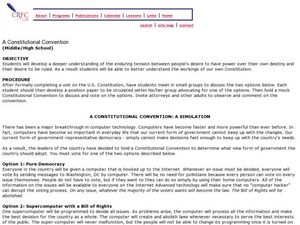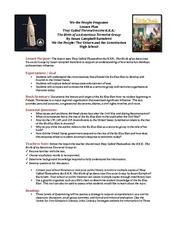Curated OER
Constitution Day
Students discuss the need for rules in their community and classroom. Using this information, they identify the authority figures at their house, at school and in the community. They are read a book about following the rules and listen...
Curated OER
South Carolina's Constitution
Eighth graders explore the definition of political culture. After viewing a movie, 8th graders discuss how the political culture of the 1600 and 1700s is reflected in early drafts of the South Carolina constitution.
Curated OER
A CONSTITUTIONAL CONVENTION: A SIMULATION
Pupils discuss two computerized options to change the current U.S. government. In this Constitutional Convention lesson plan, students write a statement advocating for one of the choices and participate in a mock modern Constitutional...
Curated OER
Race and the United States Constitution
Students examine the topic of race within the United States Constitution. Using case texts, they analyze how the documents deal with the issue of race. In groups, they explore the Court's definitions of citizen. They create a poster...
Curated OER
The Constitution of the United States of America
Students study about the Constitution by becoming the teacher themselves. They discuss the important documents leading up to the Constitution, the convention, articles, and amendments as part of their presentation.
Curated OER
Differences and Settlement in Framing the United States Constitution
Students identify the principles of democracy when framing the United States Constitution. In groups, they analyze the differences that were settled before anyone signed the document. They role play their own activity in which they...
Curated OER
U.S. Constitution: KWL
In this United States Constitution instructional activity, students complete the what I know, what I want to know, and what I have learned chart with information about the U.S. Constitution.
Curated OER
Democratic Ideas of the 1776 Maryland Constitution
Students analyze primary source documents. They evaluate how well the requirements for voting and holding office in the 1776 Maryland Constitution reflect democratic values.
Curated OER
U.S. CONSTITUTION: PREAMBLE
In this worksheet of the preamble to the Constitution of the United States, students are given the 14 lines of text to read and evaluate.
Curated OER
Fair Housing Lesson 4: Constitutional Hearing
Students investigate fair housing issues in the United States. In this government lesson, students watch "No Place Like Home," and then prepare to participate in a classroom simulation that requires them to act as state legislators and...
Curated OER
Understanding James Madison The Father of the Constitution
Learners research James Madison and create a table of his strengths and weaknesses. For this James Madison lesson, students read Jean Fritz's, The Great Little Madison, while developing their research skills, vocabulary strategies, and...
National Endowment for the Humanities
Chief Executives Compared: The Federalist Papers
Delve into the responsibilities of the president by looking at President Hamilton's opinion of the presidential office in his own words. The second in a three-part series, the resource also offers an interesting compare-and-contrast...
North Carolina Consortium for Middle East Studies
Federalists v. Anti‐Federalists
Here is a solid lesson plan to support your instruction on the Continental Congress and the Articles of Confederation. It includes close analysis of primary source images, a guided notes template and answer key, and many key points to...
Center for Civic Education
What Is Authority?
Young scholars examine the concepts of power and authority as they begin learning about government in this elementary social studies lesson. Through a series of readings, discussions, and problem solving activities, children learn about...
Curated OER
Powers of Congress
Have your class fill out this comprehension sheet while reading about the powers of Congress. There are ten multiple choice questions focused on the rights, powers, and limitations of Congressional law.
American Bar Association
What Is Separation of Powers?
Who has the power? Scholars investigate the creation of the three branches of government in the United States Constitution. They analyze just why the framers created the branches the way they did.
Curated OER
Blasphemy! Salman Rushdie and Freedom of Expression
Learners explore the concepts of blasphemy, censorship and freedom of expression through the lens of Salman Rushdie. They also consider how these issues have been reflected in US history.
Curated OER
Liberty for All: Voices from the Revolution
Did the Declaration of Independence really intend to grant liberty for all? Get your class thinking about historical perspective with documents relaying the experiences of women, white men, and African-Americans during the Revolutionary...
Benjamin Franklin Tercentenary
Benjamin Franklin, Elder Statesman
Ben Franklin was the only American to sign The Declaration of Independence, the Treaty of Alliance with France, the Treaty of Paris, and the US Constitution. An interesting resource explores his role in the latter by comparing the US...
Curated OER
The Called Themselves the K.K.K.; The Birth of an American Terrorist Group
How did Ku Klux Klan develop and flourish in the US? How did the government respond to acts of terrorism conducted by the KKK following the Civil War? How does the government respond to acts of terrorism today? This resource launches a...
Curated OER
The Importance of Inauguration Day
As Inauguration Day approaches, prepare your learners by researching the protocol of years past.
Constitutional Rights Foundation
Slavery and the Electoral College
How did slavery mold the creation of the US Constitution? The final lesson in the series focuses on how slavery impacted the creation of the Electoral College. Academics learn how the Electoral College was created because Southern states...
Constitutional Rights Foundation
The Troubled Elections of 1796 and 1800
Congress does more than create new laws. Political scientists delve into the elections of 1796 and 1800 to understand how political parties, the Electoral College, and personal agendas affected the election process. The resource also...
DocsTeach
U.S. v. Amistad: A Case of Jurisdiction
Just what is jurisdiction and why does it matter? A helpful activity takes academics on a journey to understand how judicial jurisdiction works. Scholars read excerpts from the Constitution and court documents to understand the process...

























